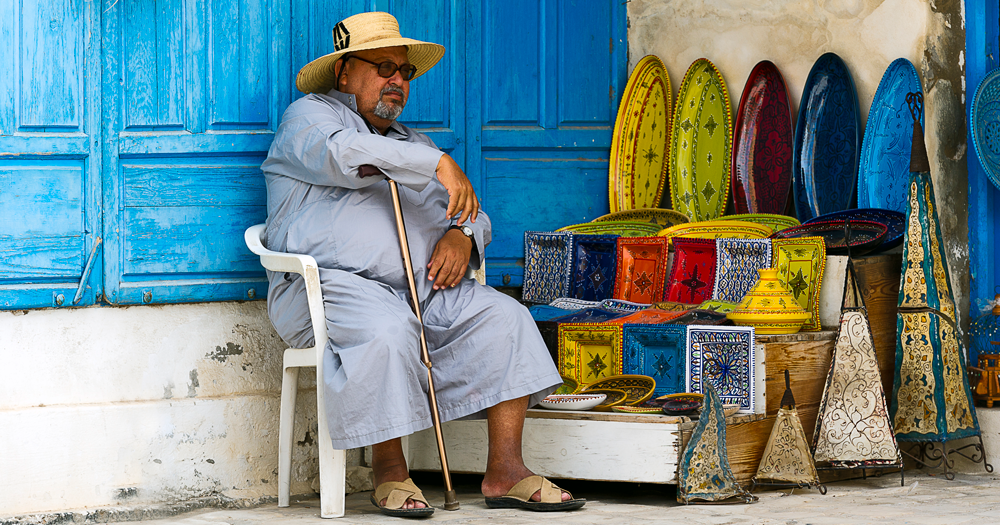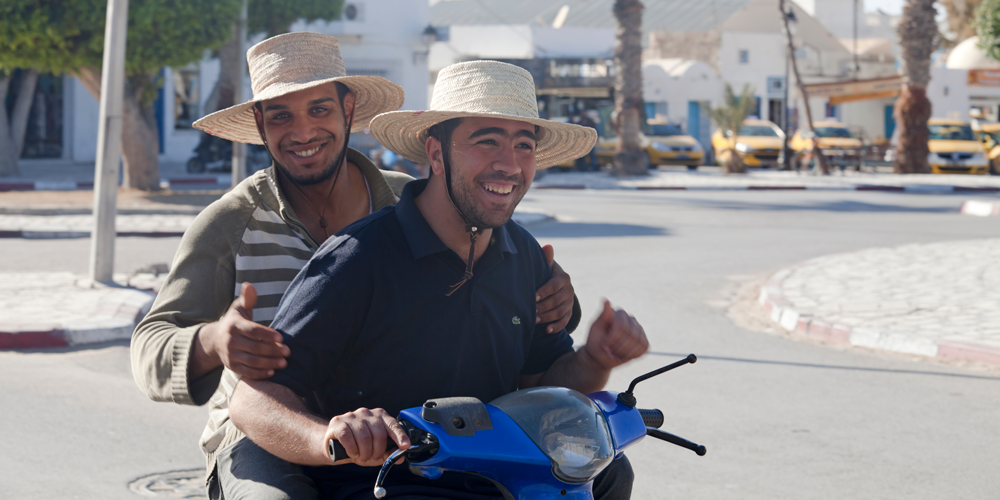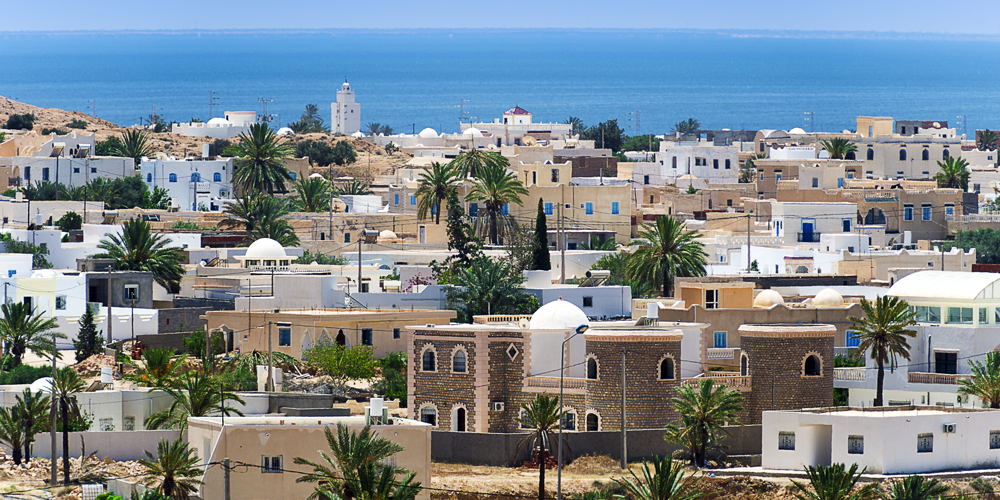In This City is a challenge to journey with us in prayer for 12 key cities in 2020. We ask you to commit to praying for fruit that will ripen and bear the seeds for mature, vibrant, and multiplying churches across the Arab world.
Introduction
Journey down to the southern coast of Tunisia and hop on the ferry to reach the so-called ‘Island of Dreams’. Surrounded by the Mediterranean, Djerba is known for its beautifully surreal coastlines and sunsets that draw many tourists, including Tunisians, south for the summer. The small island is trimmed with strings of luxurious hotels, and Houmt Souk (literally ‘The Market neighbourhood’) attracts many visitors wanting to pick up traditional Tunisian trinkets.
But the real island way of life is found in the simple shade of patios and olive trees, enjoying cups of tea or plates of couscous. Djerbians today live relatively simple lives, not too far removed from their grandparents’ way. Men work the land while women at home often gather with neighbours for tea. One city still practices the pottery trade, which has gone on for hundreds of years, while another community works in olive tree farming and the production of olive oil. Though some things have changed and modernised, the hospitable, not-in-a-rush, relationship-oriented culture remains the same.
Djerba is also incredibly rich in history and well deserves a deeper look beneath the picturesque palm trees, olive groves, and camel rides on the beach. There are 400 archaeological sites on this relatively small island, which have earned Djerba its other nickname, ‘The Island of 300 Mosques’. Though it is now home to a variety of people groups, a small remnant of a Jewish community represents over 2,600 years of Jewish presence.

About Djerba
Population: 165,000
Religions: 99% Muslim, 0.4% Christian
Ethnic groups: Tunisian Arab majority. Minorities include the Amazigh (Djerbian), Libyan Arab, Black African, Tunisian Jew. The Jewish population was 100,000 in 1940 but is now only 1,000 due to many Jews emigrating to Israel and France after WWII.
Languages: Tunisian Arabic, French
Geographical size: 514 km² | 199 mi²
Location: Southern coast of Tunisia, Gulf of Gabes
Key historical events:
- The tradition of the Jewish minority says that in 586 BC, some Israelite priests settled in Djerba after escaping the destruction of Jerusalem and the temple there.
- Ibadi Muslims laid claim to Djerba in the Middle Ages. It was then controlled by the Kingdom of Sicily twice during the 12th to the 14th centuries, then came under Ottoman and Spanish control over the course of the 16th century. Djerba remained under Ottoman control from 1560–1881 and then became a French colonial protectorate.
- Tunisia won its independence in 1956. The indigenous Amazigh peoples in Tunisia were forced by the first president post-French rule to exchange their cultural identity for a Tunisian Arab identity. Because of this, their language is close to being lost, although there have been more efforts since the 2011 revolution to conserve their culture.
- The Tunisian ‘Jasmine Revolution’ that sparked the Arab Spring in 2011 resulted in the overthrowing of President Ben Ali. It was fairly successful in bringing greater freedoms to the country, particularly in freedom of speech and religion. However, many Djerbians say they preferred life before the revolution, due to the rise in unemployment and mounting prices of basic foods.

Challenges
People
High levels of unemployment – even for those with college degrees – as well as lack of work, due to Covid-19, frustrates many. They say, ‘We just want bread on the table’, yet they feel unheard by the government. For many, leaving the country seems to be their best option. Some have opted to risk their lives, even crossing the Mediterranean to an Italian island, where they hope to find a better life. This, of course, hinders long-term growth and change in the country. There is a general sense of fear and uncertainty, and local people are weighed down by stress.
Seekers
There are only a few local believers on the island. Though many Djerbians are tolerant of foreigners of other religions, and like to point out the similarities between Islam and Christianity, a local from a Muslim background would face significant challenges if they chose to follow Jesus. Seekers may face immediate ostracism from their family, lose their jobs, or experience other forms of persecution. However, we don’t know of many Djerbians who’ve experienced this as so few are seeking.
Team
Our team members are slowly integrating with the local community, balancing language lessons with building friendships. They are persevering with their language learning to better communicate about spiritual things and matters of the heart. They hope to represent a picture of unity in a country where mistrust and brokenness in relationships runs rampant.

Prayer points
- ‘I will set my eyes on them for good, and I will bring them back to this land. I will build them up, and not tear them down; I will plant them, and not pluck them up. I will give them a heart to know that I am the Lord, and they shall be my people and I will be their God, for they shall return to me with their whole heart.’ Jeremiah 24:6–7. May God give Tunisians a heart to know that He is the Lord.
- The number of local believers in Djerba can be counted on one hand. Please pray specifically for God to open the hearts of many, creating in them a desire to read the Bible for themselves and seek the truth. Pray for dreams and visions of Jesus.
- Pray that whole households and families would experience the Word of God and follow Jesus together, and that churches would form this way. On an island that is so relationship and family-oriented, we pray in faith that God will call families of influence to be salt and light to the community.
- Lift up those who work in the tourism industry. Many have been especially affected by Covid-19 and are suffering financially. Ask the Lord to provide for vulnerable households.
- Pray for more workers in southern Tunisia. Though Djerba now has workers living there and sharing the message, millions of people in inland Tunisia still have no gospel presence in their cities.
- Remember the believers of Tunisia, too. There are an estimated 13,000 Christians in the whole of the country, and a third of them do not or cannot meet and have fellowship. Pray for their endurance as they live by faith.
 One more thing…
One more thing…
One of our team members writes,
‘In a place like this with so little gospel presence or signs of progress, it can be easy to be hardened over time and grow cynical of what God can actually do. Our prayer is that our vision will never be limited by what we see in front of us. We pray that what Paul says of Abraham in Romans 4:20–21 will be true of us: “No unbelief made him waver concerning the promise of God, but he grew strong in his faith as he gave glory to God, fully convinced that God was able to do what he had promised.”’

Thank you for praying with us.
Next month, we’ll be praying for Aswan, Egypt.